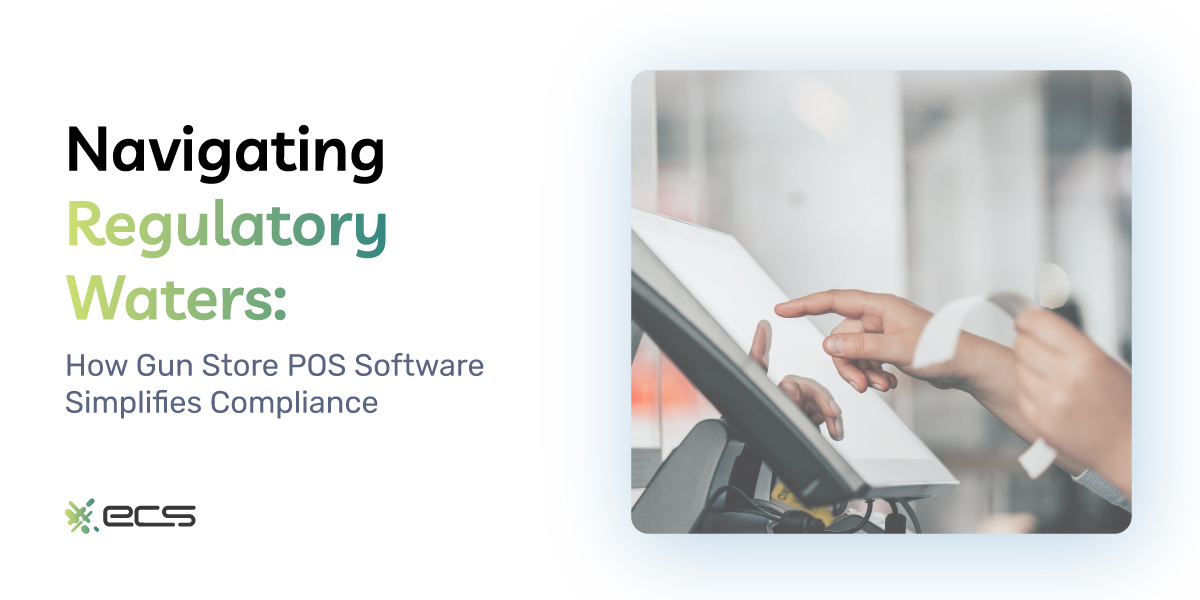If you own or manage a business that sells firearms, you’re well aware of the challenges you have to deal with on a daily basis when understanding the need for gun store regulatory compliance.
A complex web of state and federal regulations impacts virtually every transaction you make, from selling a firearm to keeping records to holding a firearm in your position during repair.
All of these actions require precise record-keeping to stay compliant. But all that record keeping can take time and costs money.
One of the ways firearm retailers have begun to lessen the burden of these regulations is through the use of a POS system. A POS or Point of Sale system combines hardware and software used during the retail checkout process.
POS systems can handle basic transactions. However, the internal software allows for expansion to offer advanced functionality, such as aiding in gun store regulatory compliance.
The right POS system can provide the perfect solution if regular compliance and paperwork bog down your firearm business. A gun store POS will reduce costs, increase efficiency, and reduce possible errors in your record keeping.
Throughout the rest of this article, we’ll go over how a gun store POS works and how it can make regulatory compliance much more manageable. We’ll also go over what to look for in a gun store POS so you can choose the right one to help your business succeed.
Firearms Retail Compliance Issues For Gun Stores
From a regulatory standpoint, gun stores are unique in the retail world. Few businesses have to deal with the complex issues that gun stores do. Each sale is highly regulated, and gun stores must keep accurate records for decades.
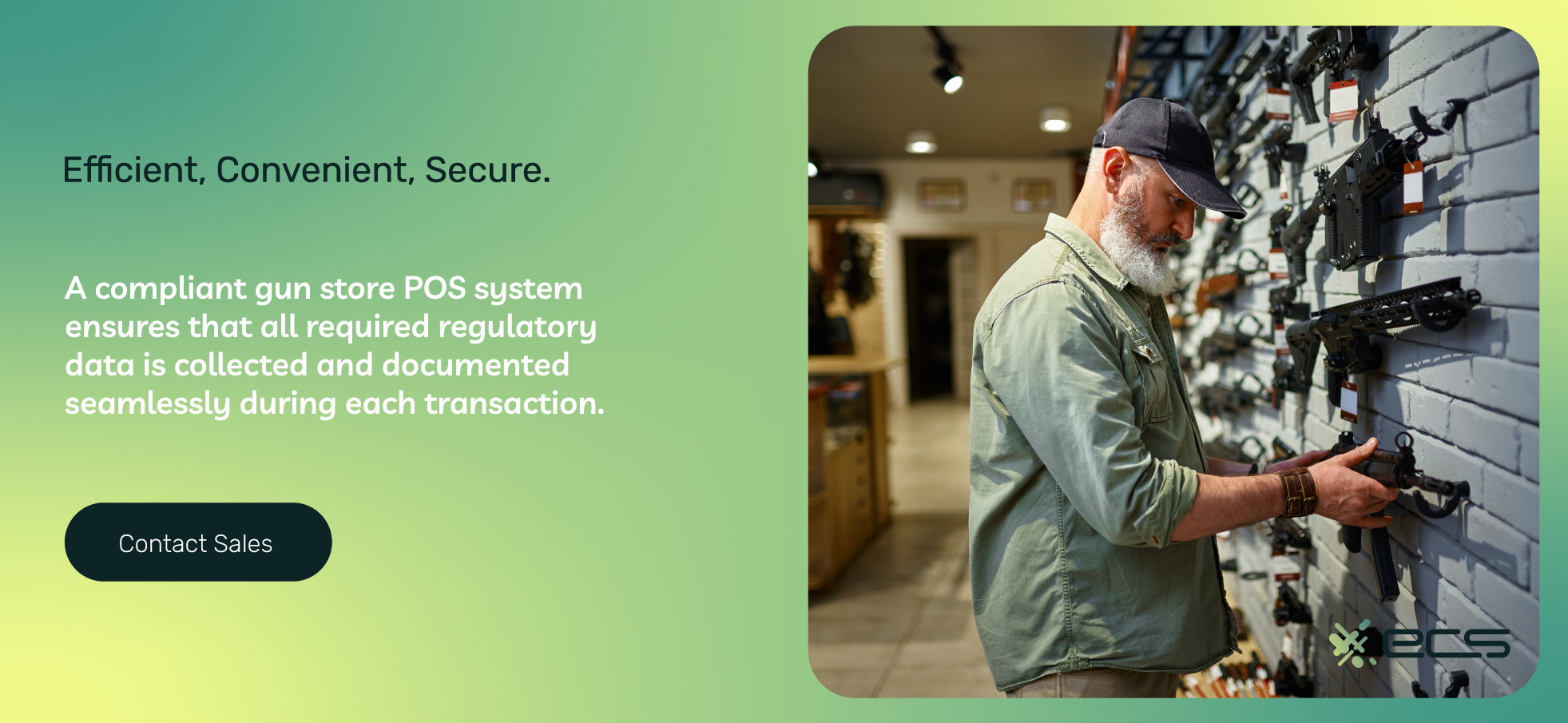
Maintaining Your Bound Book
The core of record keeping in the gun industry revolves around your “bound book” or firearms acquisition and disposition (A&D) record. This aspect of ATF (Bureau of Alcohol, Tobacco, Firearms & Explosives) compliance is one of the main gun store regulatory challenges.
The bound book is an ongoing record of every firearm you acquire or transfer to another entity. This can be another FFL or an individual. Gun stores must keep these records in sequential and chronological order and ensure they remain on-premise at all times.
A bound book entry for the acquisition will require the following information.
- Manufacturer/Importer
- Model Number or Name
- Serial Number
- Type of firearm
- Caliber or Gauge
- Date Acquired
- Name and address of where the firearm came from – If it came from an FFL or licensed dealer, then the name and FFL number are used.
Each disposition requires the following information:
- Date the firearm disposed
- Name of who it was disposed to
- If going to another FFL, their name and FFL number are required. If going to an individual, you can use the name and address or the file number of their 4473 form.
The primary purpose of the bound book is for traceability. Law enforcement agencies want to be able to trace any firearm they find back through the chain of custody, and the bound book held by FFLs helps them do that.
As a result, it’s a serious issue if your bound book does not comply with all laws and regulations. Because of this, every FFL needs to be careful about their record keeping and boundbook accuracy. A mistake in one area can quickly put you in the crosshairs of the ATF.
Your bound book must be available during regular ATF compliance inspections, so you don’t want any errors or issues during this process.
Some gun stores keep a manual or paper-bound book of firearm sales or transfers. Paper-bound books can work, but staying current with any changes to the record-keeping law is challenging. Beyond that, it’s also prone to errors.
Manual-bound books can experience errors because FFLs must record transactions during acquisition or disposition. This complicates an already hectic sales process, which can open the door for errors or omissions.
An electronic bound book is a popular option to mitigate some of these issues. These are compliant and ATF-approved electronic versions of a bound book with safeguards to ensure you are entering information correctly.
Integrating these electronic bound books with a gun store POS system can achieve even more accurate record-keeping and eliminate the possibility of missed steps during the transfer process.
We’ll touch more on bound books and POS software for FFLs in a later section.
ATF Form 4473
The federal form known as a firearm transaction record is Form 4473. It’s the responsibility of gun store owners to have each customer fill out this form during the firearm purchase or transaction.
The gun store must retain form 4473 for up to 20 years per regulations. This regulation ensures the ATF or other law enforcement agencies can request the form from firearm dealers during a criminal investigation.
Newer technology and regulations enable businesses and individuals to complete and sign these forms electronically. Electronic signatures help gun stores more easily comply with regulations and avoid errors that can occur in paper form.
Many record-keeping errors associated with 4473 forms result from how individuals fill out the forms. Customers or the FFL can often forget to complete certain areas or enter the required information.
These errors can occur when using paper forms. Electronic forms and the proper POS integration easily detect these errors or incomplete sections. The POS system will alert you or the employee of the problem and how to fix it.
According to the ATF, these are the five most common errors found when handling a Form 4473.
- The transferee did not properly complete Section A of the form
- The licensee did not record the date on which NICS was contacted on Form 4473
- The licensee did not sign and date the form
- The licensee did not obtain and/or document the purchaser’s document of identification (driver’s license/state ID)
- The licensee failed to properly identify the firearm on the form
There are standalone software programs that allow a gun store to accept these forms electronically. But the best option for streamlining this aspect of ATF compliance is integrating Form 4473 completion with your POS system.
With a POS system, you can accept e4473 forms filled out via a touch screen connected to your POS terminal. The system automatically checks if the form is filled out correctly.
This safeguard helps to ensure compliance and remove some of the most common errors when filling out 4473 forms while transferring a firearm.
When accepting e4473 forms, you can also choose to use cloud storage for the forms via your POS system. Cloud storage removes the need to store physical copies of the forms per ATF regulations.
It is important to note that if you choose cloud storage for e4473 forms, you must first request a variance from the ATF. This process is relatively simple, and many gun shops have done this so they can forgo storing physical copies of their 4473s.
Multiple Handgun Sales Report Form
Gun stores and FFLs must also comply with Form 3310.4 for multiple sales or other dispositions of pistols and revolvers.
When transferring two or more guns to the same individual at one time, you must use Form 3310.4. The ATF defines business days as the days the FFL or gun store is open for business. So, if you’re open on Sunday, then Sunday technically counts as one of the five business days under this regulation.
Two agencies require submission of Form 3310.4, making it somewhat unique. The first is the ATF. But regulations also require you to submit a copy to the chief law enforcement officer (CLEO) where the purchase occurred.
Gunsmithing and Inventory Control
If your shop offers gunsmithing services, this is another area where regulatory compliance comes into play. Every gun you take in needs the appropriate paperwork. You can do this manually, but using a POS system will help you take control of your gunsmithing paperwork and work more efficiently.
A modern POS system for a gun store will also have features for estimating costs and tracking labor or expenses. While taking in the gun, the system can automatically generate an invoice containing all the necessary information for inventory purposes.
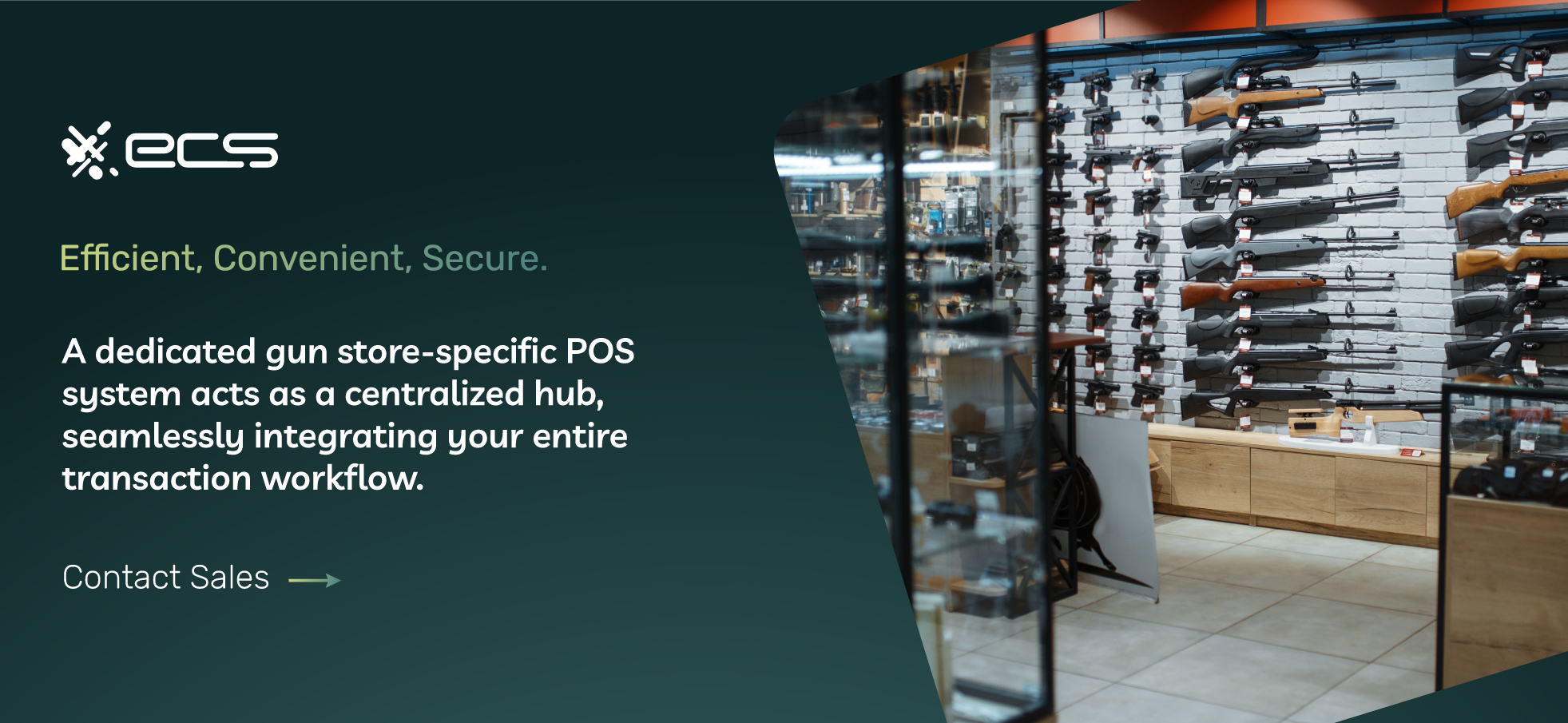
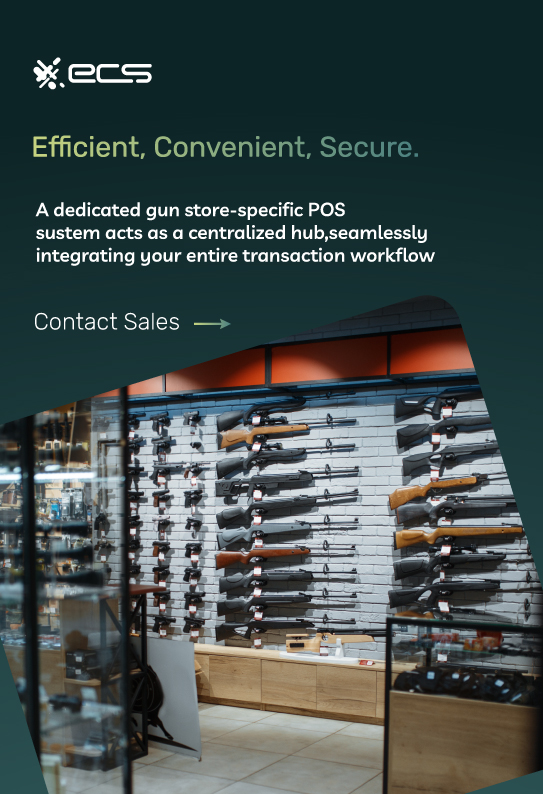
How a POS System Can Make Regulatory Compliance Easy For Gun Stores
You need a consistent workflow for all transactions to help keep your gun store compliant with regulations. Since most of your sales will be to individuals, your payment processing workflow must also include your regulatory paperwork.
If these are all part of a different system, you run the risk of errors or other non-compliance issues. For example, if you use a credit card terminal to accept payment, then use a tablet running another system to capture 4473 forms.
A gun store-specific POS system helps solve this problem by creating a centralized hub where your entire transaction workflow comes together.
The Main Components of a Gun Store POS
A gun store POS system contains three key systems:
The POS Hardware
Your POS hardware includes the devices and terminals used to interact with the POS system. This can consist of a console for your employees, which is usually a touch screen.
Gun stores also usually opt for a customer-facing touch screen to help fill out forms, sign documents or receipts, and perform other tasks.
Another critical piece of hardware for a gun store is a barcode scanner. In a gun store setting, the barcode scanner facilitates inventory control and scans identification.
Finally, you will have your payment or card reader terminals. Card readers can be standalone and then connected to your POS system. Card readers are sometimes also integral to the POS system itself.
You can buy or lease your POS hardware depending on your arrangement with the vendor or supplier.
POS Software
The POS software is what is running on the POS hardware terminal. You can think of it as the operating system for your POS system. Similar to a PC, you can add features to your POS by adding applications.
The gun store POS system will include some native applications. Third-party vendors offer other applications with added functions. Some examples of third-party applications for an FFL are range management tools or online auction support.
Your Payment Processor
The final part of your gun store POS system is the payment processor. Your payment processor provides a way to accept credit cards and other electronic payments through your POS.
Choosing your payment processor is just as important as choosing a POS. A payment processor experienced in handling high-risk transactions is necessary for firearms transactions.
A payment processor with firearms experience will also help you integrate your POS system with other business software, such as your accounting apps or payroll system.
The Right Gun Store POS System
Not all gun store POS systems are the same. Some are more focused on certain areas of gun store management than others. For example, a smaller FFL may not need the full features a POS can offer, like range management and scheduling.
To help you choose which POS system is right for your gun store, these are the top features you should consider to decide which option is right for you.
Built-in A&D Bound Book and e4473 Support
If you want to streamline your ATF and other regulatory compliance, these two features are an absolute must when considering a gun store POS.
You have a choice between two options when dealing with your Bound Book and e4473. Some POS systems include a system to manage both of these. The advantage of this is the integration of bound book and e4473 software within the POS system. This type of integration generally means that setup and the overall workflow are more straightforward.
However, the downside is a lack of customization. If you need specific features or have a particular workflow at your gun store, the included bound book solution may not work for you.
If so, you can choose a third-party bound book and e4473 service. However, third-parties make the setup a bit more complicated since you have to work with two separate systems.
Still, the benefit is that you can get precisely the workflow you need for gun purchases.
Cloud or On-Premise Solution
Today, most POS systems operate in the cloud, with vendors managing the software. Cloud systems ensure that the vendor promptly installs any updates or security fixes, keeping the POS system constantly up to date.
The vendor’s cloud storage also backs up your data. You should still use local backups, especially for critical record-keeping. However, the automatic cloud storage does provide an extra layer of redundancy should you ever need to restore your files.
Some vendors still sell on-premise gun store POS software. With on-premise software, you maintain the software yourself. You or your employees need to handle any backups or security.
The benefit is that you have more control over your own data. Also, with on-premise software, you may not have to pay monthly fees like a cloud-based solution.
Serial Number Tracking and Inventory Control
A critical part of regulatory compliance is inventory control. With firearms, as soon as they enter your inventory, you need to be able to capture the serial number. Utilizing a POS barcode scanner simplifies this process, offering the most accurate and efficient method. You should ensure your POS has this functionality.
But beyond just firearms, a POS system with barcode and serial number scanning improves your overall inventory workflow.
Maintaining your non-firearm inventory will be much easier with a POS system since you’ll have real-time access to stock levels across your store. The POS system will remove each sold product from your inventory. As a result, there are no more manual inventory counts or stocks unexpectedly running low.
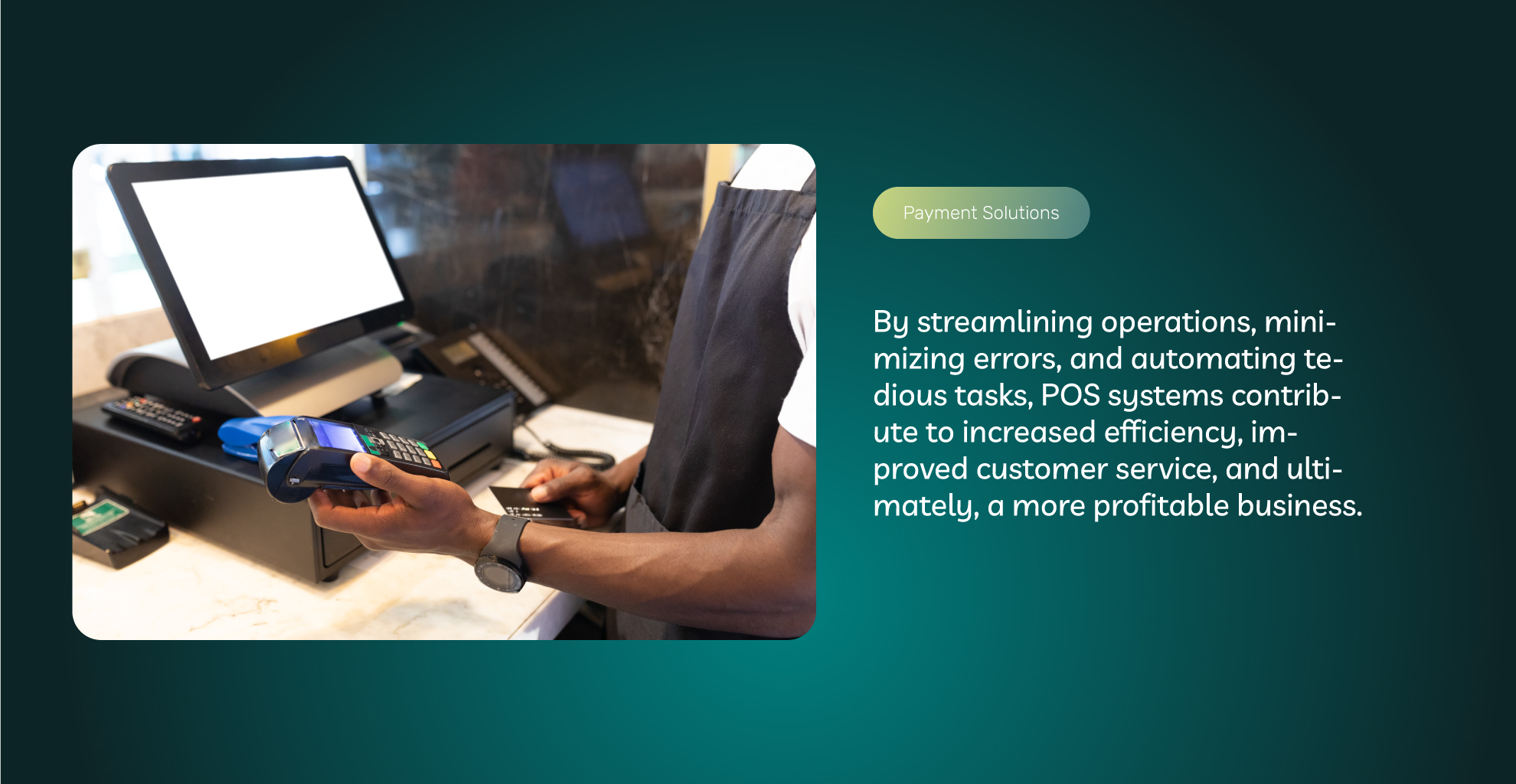
Range Management and Scheduling
A gun store with an attached range will want to look for gun range management features in its POS system.
These features vary between POS systems; some have very basic tools for small ranges. Other systems have advanced tools for scheduling and text message alerts when lanes become available.
But these tools also help with compliance and speeding up the entire check-in process. This helps take some of the workload off your staff so they can focus on more productive tasks.
For example, your POS system with a barcode scanner can scan IDs to verify identities and age. Your POS system automatically receives and stores this information, expediting check-in on subsequent visits.
Range customers can experience a faster overall check-in process by using electronic forms and waivers. When needed, electronic storage facilitates easy retrieval of these forms.
If you provide gun rentals at your range, this is another feature you want to look for in your POS.
Online Auction Support
Online Auction sites like Gunbroker in the United States are incredibly popular with gun stores. These auction sites offer a great way to reach new customers and unload inventory that may not sell at their retail location.
However, these online auctions can complicate your regulatory compliance and open the door for errors in your transfer paperwork or when conducting background checks.
If you use any of these auction sites, look for a POS system with built-in integration with the auction sites you use the most. These integrations allow you to post your firearms directly from the POS system. The same system handles all the firearm details and transfers documents like in-person gun sales.
These integrations make compliance across different channels much more manageable. Managing your auctions and transfers from one central location will help compliance but also can lower costs since you can do more in less time.
Employee Support
Managing employees can be one of the more difficult tasks when running a small business. This challenge is particularly pronounced in a gun store, where employees handle transfers.
A gun store POS helps solve this issue in two ways. First, the employee must follow the steps presented in the POS software when transferring. The system will not allow the transfer to move to the next phase if someone misses a step.
Gun store POS systems can also have features in place for employee tracking. Employee tracking helps you manage who is handling each transfer. If there is a problem with a transfer or a sale from your gun store, you can easily see which employee handled it.
Furthermore, you can integrate time tracking, HR, or payroll systems into the POS system.
While this aspect doesn’t specifically help with regulatory compliance, it does streamline your overall bookkeeping and helps you reduce costs and labor expenses.
Mobile Payment Solutions
Gun shows can be a way to increase your sales and also attract new regular customers. But selling guns at these shows can create some headaches around payments and compliance.
If you’re a business operator who sells at local gun shows, you can make the process much easier by choosing a POS system with mobile payment solutions. For this, you’ll also want a cloud-based POS so you can access your system from anywhere with an internet connection.
With a mobile solution, you’ll be able to capture all your forms electronically the same way you do at your retail location. The POS system will transfer all data into your bound book and manage the inventory.
There’s no chance of falling out of compliance when doing a transfer, and all you have to worry about is closing the sale with each customer.
Combining this with mobile payment solutions allows you to accept all the same payment methods you use at your retail location. The ability to accept more than just cash at gun shows helps increase sales and the amount customers are willing to spend.
E-commerce Features and Vendor Integration
Every gun store should have a website that displays items from your partners and vendors. This can include firearms that customers can order directly from your website. Some POS systems will allow product feed to be imported directly from large suppliers.
Gunsmithing Features
If you offer gunsmithing services, you’ll want a POS system with features to help you manage your inventory of guns under repair. This feature helps you remain in compliance and also helps you manage your workload.
Most POS systems with gunsmithing features built-in will also have powerful invoicing and work order tools that help with job costing and estimates.
Sales Analytics
If you run a large gun store or manage several locations, the sales analytics included with POS systems can help you improve your overall operations.
Real-time sales analytics can help you better track customer data across your stores. You can also use the data to find trends in your sales figures that can open up new sales or marketing opportunities.
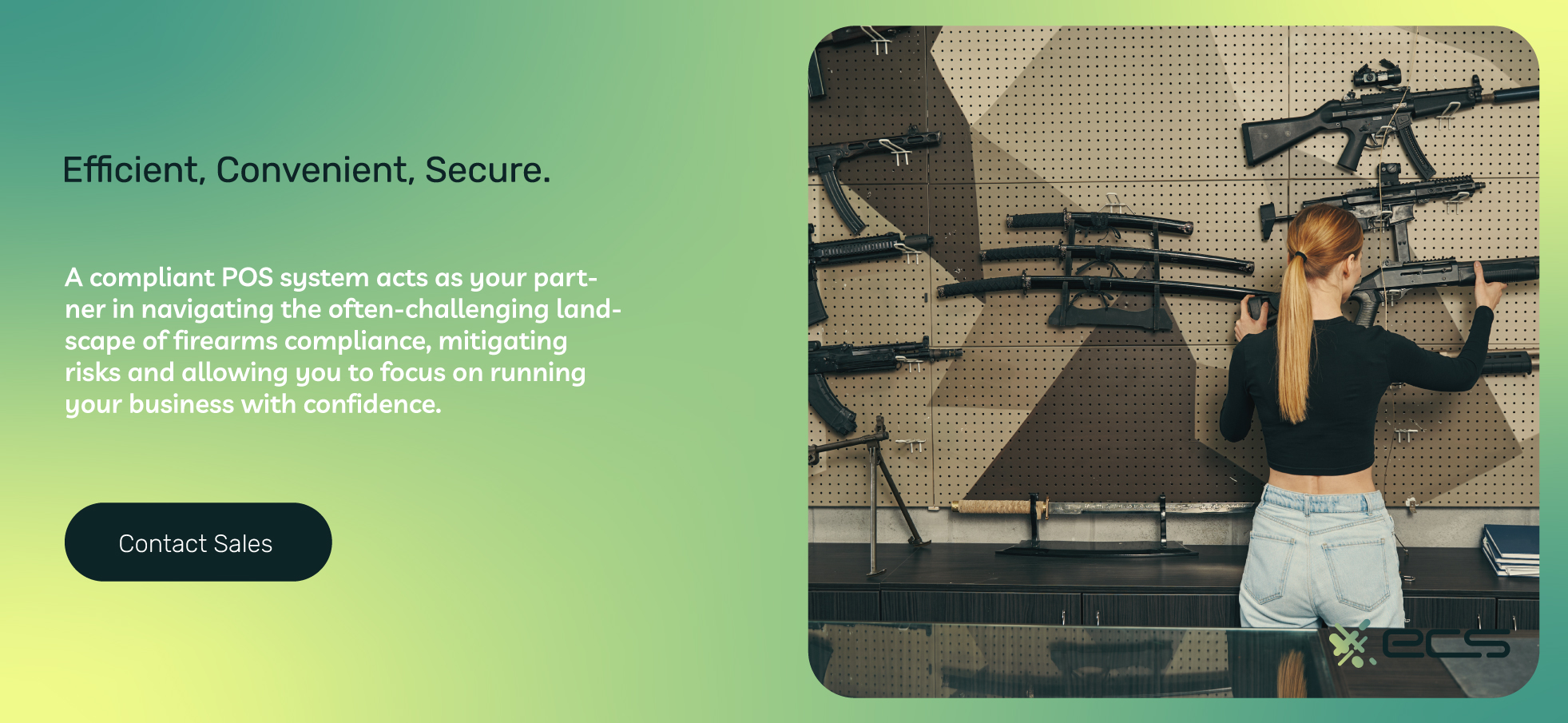
Choosing a Payment Processor
The amount of regulatory compliance required of a gun store is one of the reasons that credit card companies consider firearm purchases to be high-risk.
Being in a high-risk category can mean higher processing fees for you as a merchant. However, you can do some things to minimize these fees and help keep more money in your pocket.
The first step is choosing the right payment processor. You need a company with experience in high-risk processing, the firearm industry, and FFL gun laws. This will allow them to find you the best processing rates possible based on your transaction volumes and ticket amounts.
A payment processor with firearm experience can also help you integrate the latest payment methods, such as mobile processing or e-commerce payments for online auctions or sales.
Mobile Payment Options For Gun Stores
Mobile payment options can help you take advantage of gun show selling opportunities. With mobile payments, you can accept credit and debit cards when traveling or attending shows.
Offering customers more payment options helps drive sales and can increase the average sales amount.
Customer Support
Finally, if your gun store adopts a POS system, you’ll need impeccable customer support. We mean in-house technical support, not an outsourced help desk that is slow to respond or can’t answer all your questions.
Help Improving Compliance and Finding The Right POS System
If you’re ready to take advantage of all the benefits a gun store POS offers, contact ECS Payments.
We are experts in firearm payment solutions and can help you find the perfect POS system and integrations needed to improve compliance and reduce your overall costs.
Contact ECS Payments today to learn more about our dedicated payment solutions designed for gun shops like yours.
Frequently Asked Questions About Gun Store POS Software
A gun store POS system helps to streamline gun store regulatory compliance through seamless integration of essential functions such as bound book management and electronic completion of Form 4473. These integrated systems ensure accurate record-keeping to reduce the risk of transaction errors and ATF inspections.
Gun store POS systems touch screens help prevent common Form 4473 errors by accepting electronic form submissions. The digital system reduces errors by automatically checking for completeness, missing dates, or identification omissions.
Yes, a gun store POS system can aid in compliance with Form 3310.4 by facilitating the submission process to the ATF and the chief law enforcement officer. The system efficiently manages the required documentation for multiple handgun sales or other dispositions.
A modern gun store POS system includes features that help streamline gunsmithing paperwork and regulatory compliance, such as cost estimation, labor tracking, invoice generation, serial number tracking, and inventory control.
